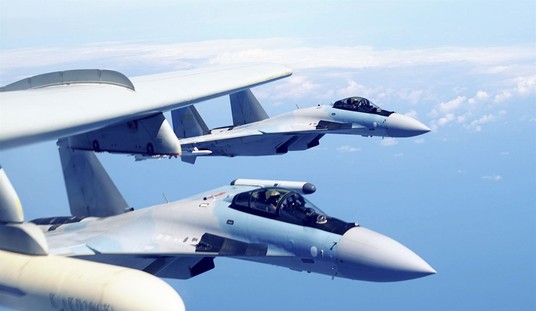Grover Norquist says he isn’t calling for a pullout, at least not yet, but that he just wants to start a conversation, according to this report from Foreign Policy. The cost of fighting in Afghanistan goes over $100 billion a year, and the president of Americans for Tax Reform wants conservatives and the center-right to absorb that figure in the context of our national crisis in debt and deficit spending. But the claim of the cost is almost entirely undocumented, and the study’s focus on al-Qaeda in Afghanistan misses the point:
Americans for Tax Reform President Grover Norquist said he wants to build a center-right coalition to advocate for considering pulling out of Afghanistan in order to save the hundreds of billions of taxpayer dollars being spent there.
As the United States grapples with the government’s fiscal crisis, the huge investment in Afghanistan just isn’t wise, Norquist argued at a private salon dinner in Washington on Tuesday evening to a group of foreign-policy minded academics and journalists. He also pointed to the opportunity cost of devoting so much national attention and resources to Afghanistan, which takes focus away from other international challenges.
Norquist teamed up with New America Foundation foreign policy chief Steve Clemons, who organized the dinner, to present his case. Clemons’s own effort to publicize the costs of the war, as detailed in the report of the Afghanistan Study Group he helped to lead, dovetails nicely with Norquist’s beliefs.
“The U.S. interests at stake in Afghanistan do not warrant this level of sacrifice,” the report states, estimating the price tag of continuing the strategy put forth by President Barack Obama at about $100 billion per year.
Is the cost actually $100 billion for those forces to be in Afghanistan, or for those forces to exist at all? We saw some of the latter kind of accounting from opponents of the war in Iraq, who rolled up costs that would have been incurred regardless of whether troops got deployed overseas or not into their figures that “proved” the US was busting the budget with its adventurism. The only reference given for the claim is the 2011 Defense budget, which lays the entire cost of the operation — including standing units that would have to be funded regardless where they were positioned. Some of that money would have gone to Afghanistan through the State Department if our military wasn’t there, as the military has been spending money on infrastructure and training for Afghans, especially in their security services.
Undoubtedly, though, we are spending a lot of money in Afghanistan that wouldn’t get spent if we weren’t at war, although pulling out won’t save us the $100 billion claimed here. What’s the trade-off? The report claims this:
With the Afghanistan Surge, the U.S. will be spending almost $100 billion per year in Afghanistan, with a stated primary purpose of eradicating just 20 to 30 Al Qaeda leaders, and in a country whose total GDP is only $14 billion per annum. This is a serious imbalance of expenses to benefit.
But we’re in Afghanistan to keep al-Qaeda bottled up in the mountain regions of Pakistan, not to fight them in Afghanistan. Hey, we’d love to see them cross the border to fight a stand-up battle against our troops, but unfortunately they’re a little smarter than that. Pakistan won’t let us explicitly invade, so the best we can do at the moment is to keep them from coming back into Afghanistan, as well as keep them from moving somewhere else in force — say, Yemen, Somalia, Sudan, or some other near-failed state. If we remove the pressure, we will end up fighting the same war all over again somewhere else, or maybe even back in Afghanistan. In the meantime, we keep the Taliban from once again seizing power and setting up the country as a haven for AQ and other terrorists all over again.
If we want to reduce the cost of our military presence overseas, perhaps we should start where we no longer face a threat to our security: Europe. We have bases and troops spread throughout the continent in support of an old tripwire strategy against an enemy that no longer exists. Our presence costs us significant amounts of money, at least by the same accounting method seen in this study. Why not close those bases and focus on actual security threats like Af-Pak, the Korean Peninsula, and the deep-sea shipping lanes? That would save us some money without losing the ability to keep AQ bottled up in the mountains and helping Afghanistan to strengthen itself enough to settle its tribal war, which is what the Taliban fight mainly is.
I’d rather save money by pulling out of regions where we’re not needed to fight rather than abandoning the only front against the global jihadists we presently have.
Update: Max Boot scornfully rips Norquist’s argument:
Norquist seems quite enamored of Ronald Reagan’s pullout from Lebanon after the suicide car-bombing of the Marine barracks in Beirut in 1983. Perhaps he is not aware that this incident was routinely cited — along with the U.S. pullout from Somalia in 1993 — by Osama bin Laden in the 1990s to justify his belief that the U.S. was a “weak horse” that could be attacked with impunity. Note to Grover: Even the great Ronald Reagan was not infallible.
With arguments like that, it is no surprise that Norquist has attracted to his cause such conservative luminaries as … Steve Clemons? Jim Pinkerton? Charlie Kupchan? If those are genuine representatives of the conservative movement, then I’m Donald Duck.
While I think conservatives won’t mind a discussion about reducing our footprint overseas to reflect the financial issues we face now, like Boot, I don’t expect this argument to hold much water with the center-right.







Join the conversation as a VIP Member